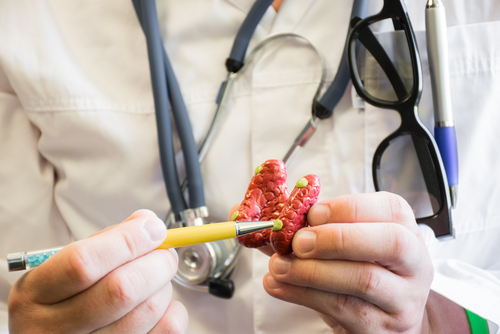The thyroid is a gland in your endocrine system that is responsible for producing hormones and regulating your metabolism. When your thyroid isn’t functioning properly, it can cause a wide range of symptoms including fatigue, depression, digestive issues, weight gain, and more. Thyroid issues are not uncommon, and many people need thyroid surgery. Whether you need to have surgery because of cancer or you have issues with your metabolism, you likely have questions. This guide will answer some questions people have when they learn they need to have surgery.
Why Is Thyroid Surgery Necessary?
Your thyroid regulates hormones in your body, specifically those that help control your metabolism. A lot of issues can develop in your thyroid, and surgery can be the most effective option to treat the issue in some cases.
Thyroid Nodules
When there is an abnormal growth on your thyroid, it is known as a thyroid nodule. Most thyroid nodules are benign, but it is possible for nodules to be cancerous. As nodules get bigger, they can cause you to have difficulty breathing or swallowing.
Thyroid Cancer
One of the most common reasons for thyroid surgery is thyroid cancer. When your healthcare provider discovers thyroid nodules, they will send a sample to be biopsied. Surgery can be used to remove cancerous nodules or to collect further samples if an initial biopsy comes back inconclusive.
Goiter
Goiters occur when your thyroid begins to swell, making it harder for you to breathe or swallow. Goiters can vary in size, with some being small and unnoticeable and others being large enough to extend into the chest. If the goiter is small and not causing any problems, usually it does not require surgery, but you should ask your doctor before determining any course of treatment.
Hyperthyroidism
Hyperthyroidism occurs when you have an overactive thyroid. Medications can be used to treat hyperthyroidism, but surgery can quickly correct hyperthyroidism and prevent the symptoms from returning. Some medications used to treat hyperthyroidism, like radioactive iodine, can have risks in the long term. If you have a history of recurring hyperthyroidism, you should consult your doctor about other treatment options.
What Are the Different Types of Thyroid Surgery?
Based on the type of thyroid issue you have and the severity, there are a few different surgeries that could be used to treat your thyroid. Some surgeries can be minimally invasive, where a surgeon uses a smaller incision to allow you to recover faster, but traditional open surgery may be necessary for complex cases or large goiters.
Lobectomy
Also known as a partial thyroidectomy, lobectomies are used to remove a lobe of your thyroid gland. This surgery is common when you have smaller nodules or indeterminate biopsy results. Once the lobe is removed, your surgeon can send a sample for additional biopsies to determine if the nodules are benign or malignant. The benefit of having a partial lobectomy is patients can retain normal thyroid function following surgery.
Total Thyroidectomy
Total thyroidectomies remove your entire thyroid gland to treat thyroid cancer, severe hyperthyroidism, or large goiters. After a thyroidectomy, patients have to go through thyroid hormone replacement therapy for the rest of their life.
Lymph Node Dissection
If you have thyroid cancer, it is possible for the cancer to spread to the lymph nodes in your neck. A surgeon will remove the lymph nodes to assess how far the cancer has spread and determine what other courses of treatment are necessary.
How Can I Prepare for Thyroid Surgery?
First, you need to talk to your doctor about medications and treatments you are currently using. Your doctor may ask you to stop taking certain medications before surgery to ensure that you don’t have any bad reactions to the surgery.
Additionally, your doctor may request that you not eat or drink in the hours leading up to surgery. You should also stop smoking before surgery to ensure that your body heals as quickly as possible. Smoking can actually delay healing and lead to infection.
What Happens During Thyroid Surgery?

Thyroid surgery first requires an IV and general anesthesia, which will put you to sleep. While you are asleep, the doctor will make a small incision on your neck. The doctor may take out all or part of the thyroid gland. If the issue was nodules, the doctor will perform a lobectomy to remove them. Most thyroid surgeries last between 1-2 hours, but may last longer when a case is more complex.
The doctor then closes the incision with tape or stitches. Some patients will still have a drain left at the incision site to remove fluid buildup. The doctor will remove this drain at a later time.
What Happens During Scarless Thyroid Surgery?
If you decide to go with scarless thyroid surgery, your procedure will look different than with regular thyroid surgery. There are two common techniques used to avoid creating a scar on your neck: the Transoral Vestibular Approach(TOVA) and Robotic Thyroid Surgery.
With the TOVA technique, your surgeon will make small incisions inside your lower lip to access your thyroid. They will then use laparoscopic tools and a camera to remove your thyroid through the incision in your mouth.
Another scarless thyroid surgery leverages cutting edge robotic technology to remove your thyroid through a small incision in your armpit. The robotic instruments make it easier to move precisely while creating a small scar that is easily concealed.
What Are the Risks and Potential Complications?
Thyroid surgery is safe, but there are potential risks and complications as with any surgery. Common risks include:
- Mild pain or swelling that resolves after a few days
- Temporary voice changes or hoarseness
- Low calcium levels
Severe complications include:
- Long-term hypoparathyroidism
- Permanent vocal chord damage
- Excessive bleeding or hematoma
If you experience excessive bleeding, you should seek medical attention immediately.
How Long is the Recovery Process?
After you have surgery, the anesthesia may take several hours to wear off. The doctor may require that you stay at the surgery center for some time after monitoring your progress and recovery. Some people stay overnight and some go home after just a few hours.
While some people are nauseous after surgery, most can eat and drink afterward. Additionally, some people need to take hormone replacement medications after surgery if the doctor removed the entire thyroid since the thyroid was previously managing a variety of hormones. Some people also exhibit signs of low calcium after surgery. Supplements can help with this problem.
While you should be able to perform some light stretches to ease soreness, you must wait for at least a week to perform strenuous exercise. The doctor may advise you to wait longer depending on your recovery.
You should expect to have a post-surgical follow up appointment within the two weeks following your surgery. Your doctor will assess how your scar is healing and how any remaining thyroid is functioning. If you have thyroid cancer, your doctor will talk to you about the next steps for any further cancer treatment you need.
Will I Need to Take Medication After Surgery?
Your doctor will typically prescribe medication for pain during your recovery. The risk of infection is relatively low, but a doctor could prescribe an antibiotic to ensure that infection does not occur. Patients who had their entire thyroid removed will need to discuss hormone therapy with their doctor and may need to start taking medication to regulate their hormones.
Will Thyroid Surgery Affect My Voice?
It is common for your voice to be strained in the days or weeks after surgery. You may see changes in your voice that last long term, but hoarseness is short term. In rare cases, the nerves in your vocal cords can be damaged during surgery, but speech therapy can help with prolonged voice issues.
What Does the Scar Look Like, and How Can I Minimize It?
Some patients worry about having a noticeable scar along their neck. Thyroid surgery scars are usually 1-2 inches long. In most cases, surgeons are able to use the natural creases of the neck to create a scarless appearance. In the first weeks of healing, you may notice a raised mark where the incision was. You can minimize the appearance of this scar by keeping it clean, protecting it from sunlight, using scar creams, and gently massaging the area.
Through the advanced facilities at TSC – Rutherford, our surgeons can perform a scarless thyroid surgery, so you don’t have to worry about a post-operation scar.
When Should I Contact My Surgeon After Surgery?
Following thyroid surgery, there are symptoms you should keep an eye out for that could point to complications. You should contact your surgeon if you experience:
- Difficulty breathing, speaking, or swallowing
- Numbness or tingling in your hands or face
- Signs of infection, including pus, fever, swelling, and redness.
- Persistent hoarseness
- Severe pain
- Excessive bleeding
What Should You Do If You Have Questions?
You should always work with a doctor you feel comfortable with. You should be comfortable asking your doctor questions about your upcoming surgery and diagnosis.
The Surgical Clinic offers thyroid surgery for those who need it. If you believe you may need a thyroid surgery or you have concerns about thyroid issues, call us today to learn more.
General surgeons in Greater Nashville

Dr. John Boskind
General Surgeon
MT. JULIET

Dr. Mariana Chavez
General Surgeon
Downtown

Dr. Patrick Davis
General Surgeon
SOUTHERN HILLS

Dr. Gretchen Edwards
General Surgeon
DOWNTOWN

Dr. Alex Fruin
General Surgeon
MT. JULIET

Dr. James Griscom
General Surgeon
NASHVILLE

Dr. Mark Hinson
General Surgeon
COLUMBIA

Dr. George Lynch
General Surgeon
NASHVILLE

Dr. Clinton Marlar
General Surgeon
SKYLINE

Dr. Willie Melvin
General Surgeon
SMYRNA

Dr. Chad Moss
General Surgeon
COLUMBIA

Dr. William Polk
General Surgeon
NASHVILLE

Dr. Drew Reynolds
General Surgeon
SAINT THOMAS WEST

Dr. Joshua Taylor
General Surgeon
SMYRNA

Dr. Davidson Oxley
General Surgeon
COLUMBIA

Dr. Tyson Thomas
General Surgeon
SAINT THOMAS WEST

Dr. John Valentine
General Surgeon
HENDERSONVILLE

Dr. Patrick Wolf
General Surgeon
SAINT THOMAS WOLF

